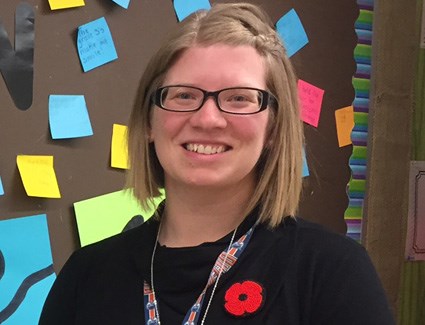 Democracy plays a vital role in Jennifer Herrod's classroom.
Democracy plays a vital role in Jennifer Herrod's classroom.
So it's no surprise that the Grade 3 teacher from Silverwood Heights School is looking forward to joining more than 80 educators from across Canada on Parliament Hill as part of the Teachers Institute on Parliamentary Democracy and then coming back to share what she's learned with her class of young students.
"I zip up jackets and I tie shoes, but we do democracy," Herrod says with a smile. "As a classroom we have our own government system working but we are more of a consensus; we work together, we foster those beliefs together. As teachers we foster our young citizens so when they see it in the classroom — when they see their voices being heard they see their voices respected — they are going out to be leaders and game-changers."
The Teachers Institute on Parliamentary Democracy is an opportunity for teachers of all grade levels to learn from political, procedural and pedagogical experts and discuss key issues in citizenship and parliamentary democracy. The participants will see Parliament in action and have the opportunity meet parliamentarians, including the Speakers of both the Senate and House of Commons. They will also hear from parliamentary officials, journalists and lobbyists to receive a full view of Canadian democracy in action.
The application process required teachers to describe their learning goals, how they would use the knowledge gained and how they would share it with their students and others in their school. For Herrod, the chance to connect with like-minded educators and the opportunity to learn strategies for teaching about topics such as Parliament, democracy, governance and citizenship is exciting. It also demonstrates to her students the importance of lifelong learning.
"I'm going to learn as an educator and I'm going to learn as a Canadian," says Herrod, who took her students on a virtual field trip to Ottawa and Parliament before her departure and will share her weeklong experience with them through blog posts.
"It is important for teachers because we need to know what we are teaching and what better way to learn than be immersed in it. I could pick up a textbook or go on a website and I could read it but to actually experience it — that's what we tell our students to do. We talk about hands-on learning and giving them those experiences and teachers need to be given those as well."
Herrod applied to attend the national institute after being inspired by attending a similar event held at the Saskatchewan Legislature. That gathering including meeting Speaker Corey Tocher and that led to an eventual classroom visit, something that made a big impression on students.
"I asked if he could come to my class and he came. The kids still talk about it. They connect it, and they remember," she says.
The Grade 3 curriculum doesn't mandate the specific teaching of Canadian government — that comes in future years — but it does ask students to learn about communities around the world and how they work. All communities, Herrod points out, have different rules, regulations and promises that they follow. By looking at communities such as family and classrooms, things young students can easily relate to, teachers are sharing lessons of government, legislation and democracy and are preparing students for future learning.
When her seven- and eight-year-old students debate topics such as indoor or outdoor recess or make a classroom decision by voting, Herrod believes they are learning a lesson about the value of democracy in society and are being given a voice that allows them to be confident in their choices.
"I say this (the classroom) is a democracy; you have a choice. But with that right to vote comes a responsibility to respect what others chose and to try and see their point of view and respect their ability to choose. It's great to see them take charge. You give them the smallest little choice and they are 'Yes, I did it.' They figure out how to respect other's decisions."